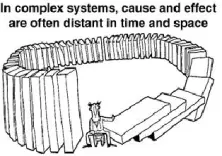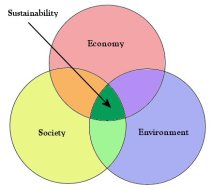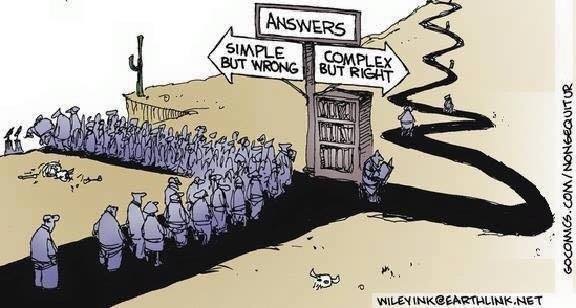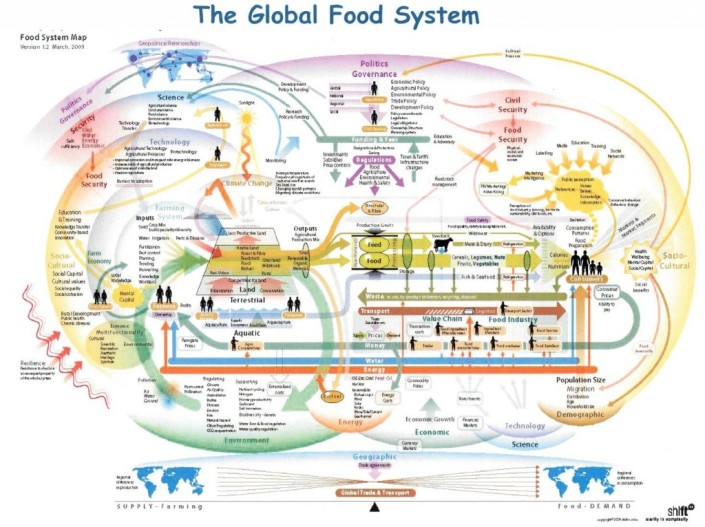 This page was created to support and challenge students taking STOCKSCH 379 – Agricultural Systems Thinking. Learning to be a systems thinker will not directly help you learn how to grow food, but it just may be the most important class you will ever take….
This page was created to support and challenge students taking STOCKSCH 379 – Agricultural Systems Thinking. Learning to be a systems thinker will not directly help you learn how to grow food, but it just may be the most important class you will ever take….
Let me explain….
First, the class is called “agricultural” systems thinking simply because I spend most of my time thinking about food and farming stuff. But the systems thinking tools I teach can be used to better understand any complex system. Although this skill is critical to advancing our global sustainability agenda, classes in systems thinking are missing from most university programs today.
As I wrote in “Learn to Think Like a Mountain”….
“Our educational system trains students to think in a linear, logical, analytical way – at best, or simply to memorize disconnected facts – at worst. Graduates are well-prepared to take exams and write papers, but not to think creatively and systemically about climate change, war, poverty, hunger, environmental degradation etc.”
 Most students are ill-prepared to understand the complex problems we have created by our single-minded focus on economic viability, which we pursue at the expense of environmental integrity and social justice. Industrial agricultural systems, which are found everywhere on the planet, damage the environment, exploit humans, and manipulate other species to benefit the short term interests of those who have money and power. In doing so, we produce lots of relatively cheap food! In the United States, we expend less than 10% of our income on food but our food system cannot be considered truly sustainable if we factor in all three critical sustainability objectives; economic vitality, environmental integrity, and social justice.
Most students are ill-prepared to understand the complex problems we have created by our single-minded focus on economic viability, which we pursue at the expense of environmental integrity and social justice. Industrial agricultural systems, which are found everywhere on the planet, damage the environment, exploit humans, and manipulate other species to benefit the short term interests of those who have money and power. In doing so, we produce lots of relatively cheap food! In the United States, we expend less than 10% of our income on food but our food system cannot be considered truly sustainable if we factor in all three critical sustainability objectives; economic vitality, environmental integrity, and social justice.
Our short term success growing food for the past 50 years has made us overly confident. We think we know what we are doing! We bend Mother Nature to do our will – but we lack the capacity to control the unintended consequences of our actions. The results produced by the industrial agricultural system are many and complex, both positive and negative:
- lots of cheap food
- radical global climate change
- the convenience of food available every day
- environmental degradation and energy depletion
- a tremendous diversity of food products available on the shelves
- low wages and poor or no health benefits for most food system workers
- record profits for food corporations like PepsiCo and food retailers like Walmart
Is industrial agriculture successful?
The industrialized agricultural system is VERY successful at its primary purpose (result #7 above) making rich people richer. Some of the other socially positive outcomes of the industrial system (1, 3 & 5) are nice “side effects” of the primary purpose. And clearly the socially and environmentally negative consequences (2, 4, 6) are not intentional. Since they are “external” to our single-minded vision and linear understanding of the purpose of the food system, they are unseen. Systems thinking allows us to see how our actions can have unintended consequences.
Agricultural Systems Thinking can help us to:
- discover the root causes of our most perplexing agricultural problems,
- learn how to build resilience into food and farming systems,
- see how our linear thinking creates our problems, and
- ultimately how to manage complex systems for multiple objectives (economic, environmental AND social) and thus move us toward a more sustainable and truly successful agriculture .
The “ah-hah” moment
When we learn how to use causal loop diagrams (one of the systems tools) to examine why our “fixes” to a particular problem are not working – and in fact may be making the problem worse – we can see that an unseen feedback loop is at work. For example, those people who have an investment in the status quo often cite the global corporate food system as the OBVIOUS solution to hunger and malnutrition. However, the “fix that fails systems archetype” helps us see that corporate control of the food supply is a root cause not the solution to global hunger.
Frankly, linear thinking is dangerous…. because it always leads us to the wrong answer to problems from a sustainability perspective! Complex, real world problems will never be solved with simple, linear, “common-sense” thinking.

At first, systems-based solutions appear counter-intuitive (because we are so well-trained at linear, simple cause and effect, thinking). But when we practice using these tools, we can begin to have the big “ah-hah” moments of deep understanding of complex problems. Then – just maybe – we will have a chance of improving problematic situations that have plagued us for centuries.
How do we learn to think about complex systems?
Our disciplinary-focused educational system does not prepare us to understand complexity or manage for multiple objectives very effectively. Again, from “Learn to Think Like a Mountain“:
Systems thinking tools are needed to begin to understand why these systemic problems are so resistant to our efforts. Systems thinking is a way of understanding complex real-world situations such as those often encountered in sustainable food and farming careers.
Industrial agriculture represents a very complex global system of producers, shippers, manufacturers, retailers, processors, and financiers. The linear and logical analysis process taught in most universities is simply not adequate to understand this system. Systems Thinking tools such as the “Mind Map” pictured below are needed.

So where do we look for a solution?
In STOCKSCH 379 – Agricultural Systems Thinking, students are offered a toolbox of thinking skills that allow them to integrate knowledge across multiple disciplines. This class fulfills a General Education requirement at the University of Massachusetts Amherst called “Integrative Experience.” According to a statement on Integrative Learning from the Association for American Colleges and Universities & the Carnegie Foundation for the Advancement of Teaching, March 2004;
“Integrative learning comes in many varieties: connecting skills and knowledge from multiple sources and experiences; applying theory to practice in various settings; utilizing diverse and even contradictory points of view; and, understanding issues and positions contextually.”
Some examples of systems thinking tools that contribute to integrative learning may be found in some of my other blog posts:
- Lessons in Agricultural Systems Thinking
- Digging For Root Causes
- The Mind Map
- Fixes That Fail
- The Power of Mental Models
- Resilience in Agricultural Systems
- Worldview, Clocks and Trees
- Systems Thinking and Hierarchy
- Symbols Matter
- Change How We Think
There will be no sustainable agriculture until we become more skilled at systems thinking!
===========================================================
Check out our UMass Sustainable Food and Farming Bachelor of Sciences degree program and our Online Certificate Program at the University of Massachusetts to prepare yourself to work on issues like this.
September 1, 2016 at 5:25 pm
This is a topic that we discussed often at The Farm School. It will be interesting to discuss the ideas and experiences that will come up through this course.
LikeLike
September 1, 2016 at 9:00 pm
I hope that understanding these complex systems after taking this class I will better be able to explain the importance of sustainability and changing our food systems.
LikeLike
September 2, 2016 at 1:09 am
Understanding systems that are damaging greatly enhances the chances of changing those systems and I hope to see how this can be applied to learning from system failures.
LikeLike
September 2, 2016 at 2:36 am
I am excited to talk more about the complexities of the food systems! Often times we focus too much on the big picture and not the small parts of it- including the ag workers and other people corporations have to step on and exploit.
LikeLike
September 2, 2016 at 3:18 am
I am excited to learn some new thinking tools to help understand food systems holistically. In particular, I’m curious about the concept of positive and negative feedback loops and how these loops emphasize the true, cyclical nature of sustainable systems. Additionally, I hope to apply these thinking tools to systems related to food and farming such as sustainable energy, local enterprises, and healthcare.
LikeLike
September 3, 2016 at 3:05 pm
Really looking forward to this class. I always enjoy discussing complex problems but do sometimes feel like I’m lacking the proper tools to discuss these problems in a realistic way. Global problems will have many solutions and to find those solutions people are going to have to start thinking more in the long term instead of just breaking problems down to their effect on profits.
LikeLike
September 4, 2016 at 2:38 pm
I think that in our fast paced world where many people want to receive instant gratification/reward, superstores and large corporations like Walmart are able to thrive. In order to maintain sustainability in our food systems, we must be willing to make sacrifices, like prior planning of planting gardens, shopping at farmers markets, planning out our meals to reduce food waste. We must look beyond simply growing food, and also evaluate our mental models. I am looking forward to exploring these ideas in class.
LikeLike
September 4, 2016 at 6:37 pm
I wish it was possible for every major to have a course on systems thinking. Being able to take a step back and look at every aspect of a system, but also being able to understand each part fully, makes both problems and solutions easier to see. I’m excited to learn more about these new ways of understanding.
LikeLike
September 4, 2016 at 7:05 pm
These are some skills I have wanted to learn for a while now. After looking at the Global Food Systems map, I am amazed by how much goes into food systems.
LikeLike
September 4, 2016 at 7:20 pm
I would be curious to hear everyone’s thoughts on the aspects of industrial food production that are mirrored in small scale agriculture. While much of what we do focuses on sustainability, are there elements of industrial ag we simply can’t give up? Much like it is difficult to shake the mindset of linear thinking, I think it is hard and sometimes impossible for small ag to avoid looking very similar to its industrial counterpart.
LikeLike
September 4, 2016 at 7:42 pm
It’s so great that Stockbridge takes the time to teach its students about systems thinking. This makes me think of a time earlier in my degree before I settled on the SFF major. I spoke to my advisors about trying to combine Environmental Science and Health Science, but I was told that it was impossible due to a lack of overlap between the two fields. I felt limited and frustrated by this type of linear, boxed thinking that was happening at my university. To me it seemed so clear that environmental health and human health are two of the many fields that intersect in the agricultural system. As I finish my third season of farming and get ready to finish my degree, I’m looking forward to unpacking the complexities food system further over the course of the semester.
LikeLike
September 4, 2016 at 7:56 pm
The more I learn about the changes that need to be made in order to create a truly sustainable future and a world that values individual freedoms and creativity, I realize it must be done through education. Not education in the traditional sense however, but the type of learning that comes from encouragement and the spreading of ideas freely as I foresee happening in this class. I’m very excited about delving into these discussions deeper and seeing what we can discover as a class.
LikeLike
September 5, 2016 at 2:50 pm
I’ve always been amazed at how much energy goes into our food systems. My grandparents and great grandparents were always adamant that working the land on a small scale produced better foods and made you more aware of where food came from. I’m hoping that in this class I can take what I’ve always known about agriculture from an agricultural family and the science that I’ve learned at the university and combine it into a more cohesive knowledge of agricultural systems.
LikeLike
September 5, 2016 at 4:52 pm
I am excited to learn more about this topic in class and learning how to approach large issues like hunger not with a linear way of thinking but keeping in mind the complexity of our food system.
LikeLike
September 5, 2016 at 6:43 pm
I look forward to gaining insight and tools to help me think about solving the issues of our food system in America. I hope that class time will be well spent as we go through various subtopics. I hope that this class will help me in the future as I work toward changing the policies and the culture of our food system to benefit the economy, the environment and our diverse society.
LikeLike
September 5, 2016 at 7:21 pm
Looking at the global food system map you could easily feel overwhelmed and wonder how you can change such a complex web. I try and think of it not as becoming defeated but think of it more of a challenge instead. I’m excited to discuss the ways things can be changed!
LikeLike
September 5, 2016 at 8:54 pm
I am increasingly concerned with justice related to food production, distribution, accessibility and consumption, and the ways in which unexamined perspective may negatively serve food justice causes.
Despite the best of intentions, it seems to me that at least some food justice initiatives use fixes that fail (or that only partially work). For instance, emergency food programs don’t appear to be an appropriate solution to some of the root causes of food insecurity such as poverty, segregation, unjust wage laws and disproportionate funding of big-ag. I think we need to be willing to address these bigger issues, in partnership with both farmers and other professionals and individuals, in order to make progress towards food equality.
LikeLike
September 5, 2016 at 11:31 pm
In my opinion many people overlook the system for the benefit of the narrow minded short term solution. I look forward to broadening my system thinking, especially that reflated to agriculture. The contemporary food system/web may be hard to change, but the first step is to understand it though a course like this one. I hope to relate this course to not only my major, sustainable horticulture, but to all other aspects of my life.
LikeLike
September 5, 2016 at 11:48 pm
“Capitalist production, therefore, develops technology, and the combining together of various processes into a social whole, only by sapping the original of all wealth-the soil and the laborer”-Karl Marx, Captial, volume I, chapter 15.
Id love to discuss and observe with you all on the destructive forces of capitalism, and how this system (globally) is the root cause of inequality, pollution, and continuous warfare etc… but more exciting than coping and discussions on the flaws of such system; what can this system look like, if its including environmental integrity, social justice, and economic viability? along with some real soft, fertile, loam.. mmhm.
P.S SUBSIDES SMALL FARMS!?
LikeLike
September 5, 2016 at 11:52 pm
I have really enjoyed scratching the surface of systems thinking in some of John’s other courses. I am excited to further the discussion and to look below the surface at some of today’s most challenging issues.
LikeLike
September 6, 2016 at 12:13 am
Integrating complex systems thinking into our society is essential, and investing in local land and community projects creates a more resilient local economy. Local and regional systems with numerous connections creates more of a safety net, instead of a band-aid, one time solution. This linear mindset is so engrained into our society and roots that it’s hard to sway some people to be more open minded to possible solutions.
LikeLike
September 6, 2016 at 12:34 am
It is always refreshing to read something that breaks down how our food system is corrupt, and also provides a seemingly accessible and realistic solution despite the culture we live in. I am truly looking forward to learning more about these systems, good and bad, with a bunch of like-minded folks.
LikeLike
September 6, 2016 at 12:50 am
I am excited to dive in to the details of how one can have a positive effect on the food system as a farmer/producer. I am interested in looking at the tangible benefits/costs of certain practices that occur in both small and large scale agriculture. I am interested in how we can make localized agricultural systems more sustainable environmentally and socially just by examining effective practices that can be easily implemented while maintaining an understanding of farmers’ needs and bottom line.
LikeLike
September 6, 2016 at 1:00 am
I definitely feel frustration when I try to figure out what to do to help the world through making a more just and sustainable food system, so I’m hoping through this class I’ll be able to untangle some of these knots and find a way to help.
LikeLike
September 6, 2016 at 2:40 am
I am extremely interested in how to apply theories of sustainability into the practice of small scale organic agriculture. Having worked on several production farms, I have observed that when ‘push comes to shove’, farmers are often forced to make decisions prioritizing economic viability over social justice or environmental stewardship. I would like to draw from real-world examples of people whom have reached sustainable success and understand how they have developed their businesses using Systems Thinking Tools.
LikeLike
September 6, 2016 at 2:55 am
It is easy to feel frustrated about our food systems and point fingers; however, there are a series of causes to this overwhelming problem. Though it is easy to blame large scale farmers, it is important to remember that they are people too with families they have to feed. In order to affect change large and small farmers alike need to work together. I am excited to learn from everyone’s experiences and work together to make our future bright!
LikeLike
September 6, 2016 at 4:07 am
This is something that I think is so important to discuss. I’m looking forward to learning more about agricultural systems, particularly because there are a lot of times I feel lost when it comes to facing and taking on the environmental and social problems we’ve created using the industrial ag model. I know it’s fixable, and I’ve got many general ideas how, but I feel like this class will help break down the “how” part even more, or at least give us the skills to help figure it out ourselves.
LikeLike
September 6, 2016 at 11:36 am
Learning and understanding how to examine and interact in complex, interconnected systems is important in learning how to amend the real root causes of the detrimental issues facing the world. I am looking forward to learning how to better understand systems thinking and how to better integrate it into my life and the choices I make.
LikeLike
September 6, 2016 at 1:47 pm
The details of the agricultural system I think are extremely overlooked by most people, especially here in Stockbridge where there are many good ideas, but the economic viability just isn’t there. This is such an important topic for people who want to go into the agricultural industry to understand so they can apply it and make the system better and I am excited to learn and discuss these issues
LikeLike
September 6, 2016 at 3:27 pm
After reading about Agricultural Systems Thinking I am looking forward to learning the different systems thinking tools and how they can help broaden my understanding of the complex systems we are faced with. By the end of the semester I am curious to see how I will be able approach different situations/problems in a more creative and thoughtful way. I look forward to meeting and learning with all of you!
LikeLike
September 6, 2016 at 3:27 pm
This article speaks briefly on industrial agriculture, and specifically its role in the separation of wealth in this country. I felt that this part of the article intrigued me and sparked some more interest into Ag systems thinking. After reading the article I seem to have a better grasp on what our class will be about. The graphic of the global food system is a great addition to this article. It helped me to visually see how many factors and variables are happening and can influence the food we all eat.
LikeLike
September 8, 2016 at 3:43 am
I am most interested to learn about how the decision in large and small agriculture are made, who these decisions are directly and indirectly effecting, and if these decision makers have similar or different intentions.
Some questions that I have after reading the description of this class are mostly in regards to the “ah-ha” moment. Some may find it easier to reject the corporate organization of food distribution and production. Where the real challenge comes in is to find the system that rightly produces and distributes food to all. So is the ah-ha moment realizing that our system is broken, or when we finally see the slow aftermath of the actions we take to fix it.
LikeLike
July 28, 2017 at 8:10 pm
Hello blogger, i must say you have high quality articles here.
Your blog should go viral. You need initial traffic only.
How to get it? Search for: Mertiso’s tips go viral
LikeLike
September 5, 2018 at 10:47 pm
I love the saying, “think like a mountain”. Understanding complex systems with a circular perspective and looking around to truly see the whole picture is so important and I am so excited to spend the semester learning more about how to broaden my ability to do so. I think education is the key to making any successful change and I am hoping that this class will allow me to think deeper so that I know how to encourage others to do the same. It is also reassuring and inspiring to see a teacher (even on the first day) that is so passionate about what he is teaching!
LikeLike